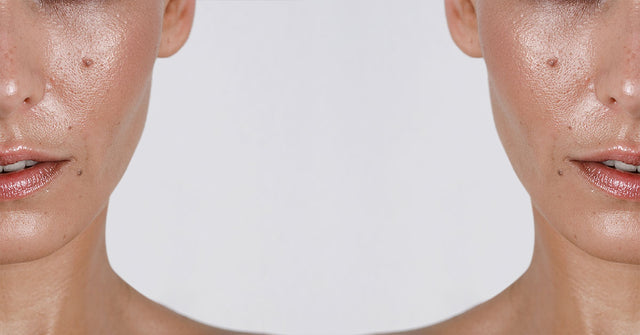While pimples, rashes, and sunburn can all be upsetting when they occur, dry skin around the mouth can be especially disconcerting, particularly if you’ve never experienced it before.
There are several reasons why you may develop dry skin around the mouth and although it’s usually not a cause for concern, it can be very uncomfortable, so understandably, you’d want to treat it as soon as possible.
With winter looming, here’s everything you need to know about what causes dry skin around your mouth.
Factors That Cause Dry Skin Around Your Mouth
To successfully treat dry skin, we must first classify what’s causing it and the sooner you can do that, the sooner it will start to get better. While the condition can be symptomatic of many different issues, here are the leading factors that cause dry skin around the mouth.
UV Exposure
Chances are, you’ve probably experienced a sunburn on your face at one point in your life. Hot to the touch, inflamed, and sore, sunburns can be extremely uncomfortable and as they heal, the skin begins to flake off, which can cause dry skin.
We know that UV rays can accelerate the aging process and are so strong that they can actually break down your skin's protective barrier and severely dehydrate your skin.
If you experience a sunburn around your mouth, wash the area with a gentle cleanser, use a lightweight moisturizer, and apply some soothing aloe gel. Additionally, avoid using any active ingredients like retinoids until the skin heals.
Allergies
Allergic reactions can be triggered by food, topical treatments, laundry detergent, pet dander, and more, making it very hard to pinpoint the exact cause. You could even develop an allergy to something you’ve never been allergic to before.
However, skin allergies are usually easy to treat when the cause is determined. If you think that the cause of the dry skin around your mouth is related to allergies, talk to your doctor, who may recommend an allergy test.
Perioral Dermatitis
A type of inflammatory rash, perioral dermatitis can occur when using certain topicals containing steroids. It can also flare up from the use of inhalers and certain kinds of toothpaste. It’s usually rough and scaly and can cause blistering and itchiness.
Antibiotics and topical antifungal creams are the gold standards for treating perioral dermatitis. While the condition can last anywhere from weeks to months, if treatment is successful, it usually won’t come back. Contact your doctor if you suspect that the dry skin around your mouth is perioral dermatitis.
Eczema
Eczema, also known as atopic dermatitis, is an inflammatory skin condition that affects about 30 percent of Americans. It’s considered a lifelong, chronic disease and can present itself anywhere on the body, including the skin around the mouth.
It results in dry, flaky, red, itchy skin and while there is no cure, moisturizers and creams are recommended to prevent symptoms from increasing in severity. Steroid creams can also help alleviate discomfort caused by the condition.
Lack of Sebum
There is a chance that the dry skin around your mouth is a result of a lack of sebum. Sebum is an oily substance naturally secreted through our pores to lubricate our skin and decreased production can be a result of certain medications or genetics.
Generally, this issue can be treated with the use of moisturizing products, like serums and moisturizers, as well as occlusives like Vaseline or Aquaphor, so even if your dry skin is genetic, it doesn’t mean you have to suffer from it.
Weather
When the seasons change and a drop in temperature occurs, it can cause your skin to become dry and flaky. Fall and winter months can exacerbate dry skin, especially around the mouth, where the skin is thinner.
If you’re concerned that the weather is drying out your skin, switch to a heavier moisturizer and consider incorporating a face oil into your routine.
Dehydration
It’s a fact that we’re made up of about 60 percent water and since the skin is our largest organ, it’s easy to see the effects of dehydration. When the skin becomes dehydrated, it can feel dry and itchy, which can also show around our mouths.
While drinking water is important for our overall health, the best way to rehydrate our skin is to apply water-binding serums and moisturizers. Look for those that contain hyaluronic acid to attract water and lock it in your skin for lasting hydration.
Chemical Products
If you’re experiencing dry skin around your mouth, it might be time to simplify your routine until your skin barrier heals. While retinoids, exfoliating acids, benzoyl peroxide, and sulfur are wonderful for treating a myriad of skin concerns, they can’t work optimally when your skin barrier is compromised.
If you’re not diligent about moisturizing and hydrating your skin, active ingredients and harsh chemicals can cause damage to your skin barrier. Stick to a gentle cleanser, moisturizer, and sunscreen until your skin repairs itself.
Excessive Licking of the Lips
If you’re struggling with dry skin around your mouth, it might be because you’ve been licking your lips excessively. Saliva can dehydrate the skin, so licking the area regularly can cause your lips and the skin around your mouth to become dry.
Avoid using flavored lip balms that you might be tempted to lick, and instead, use a plain balm and healing occlusives like Vaseline or Aquaphor until the skin repairs itself.
Other Skin Conditions
Unfortunately, dry skin can be caused by several other conditions. If you can’t pinpoint what’s causing the dryness around your mouth, consult your doctor right away because left untreated, long-term damage may occur.
How to Avoid Dry Skin Around Mouth
Now that we’ve identified potential causes of dry skin around the mouth, let’s talk about how to avoid and prevent it so it's not something you'll have to deal with in the future!
Protect Your Skin and Wear Sunscreen
Wearing sunscreen protects your skin against sunburns, sun damage, and irritation. Not using it can result in premature aging and serious skin conditions, so apply it daily, even on overcast days. In addition to being essential for keeping your skin healthy and free from damage, it can prevent problems like dry skin around the mouth.
Exfoliate Regularly
Regular exfoliation provides a multitude of benefits, from fading discoloration to reversing signs of visible aging. When you regularly exfoliate, you remove dead skin cells that might otherwise result in dry, flaky skin, including the area around the mouth.
While it’s important to exfoliate regularly, if you’re trying to heal dry, irritated skin, avoid doing it until the skin heals itself or you risk damaging your skin barrier further.
Follow A Healthy Lifestyle
A healthy lifestyle that includes a balanced diet and regular exercise is important for glowing skin. Eating water-rich foods, getting enough protein, and consuming healthy fats help fortify your skin barrier and keep it strong.
Additionally, exercise can help reduce the stress that over time could lead to signs of aging showing on your skin, especially around your mouth.
Drink More Water
In addition to increasing your consumption of water-rich foods, you should also sip on water throughout the day to get all the benefits it has to offer. Getting enough water ensures that our skin is moisturized, soft, and smooth whereas dehydration can present itself through dry, itchy, flaky skin.
Aim for at least eight glasses a day to start reaping the rewards!
Use a Humidifier
Dry climates, heaters, and cold weather can all contribute to stubborn dry skin around the mouth, so if any of these apply to you, consider investing in a humidifier.
They keep the air moist to ease dry skin and they’re also wonderful for at-home self-care days!
Treat Your Allergies
If you suspect, or know for sure, that the dry skin around your mouth is a result of allergies, take your medication as directed or talk to your pharmacist about using an over-the-counter antihistamine, which can also provide relief.
As previously mentioned, don’t hesitate to visit your doctor if you’re concerned about potential allergies causing dry skin around your mouth.
FAQs: Causes of Dry Skin Around the Mouth
Question One: Why do I have dry skin around my mouth during pregnancy?
It’s very normal to develop dry skin during pregnancy. As the body undergoes hormonal changes, the skin loses water and this can present itself anywhere on the body including around the mouth.
Question Two: Why do I get dry skin at the corners of my mouth?
Dry skin specifically at the corners of the mouth is often caused by saliva in that area or may be due to a nutritional deficiency. Left untreated it can become very sore and cracked so it’s best to see a dermatologist as soon as you notice it.
Bottom Line
While investing in quality skincare and practicing self-care can help prevent dry skin around your mouth, if it already exists, it can usually be treated successfully once the cause is determined.
Talk to your doctor or dermatologist if you’re unable to identify the cause yourself and remember to follow our tips above, which will not only help improve the health and appearance of the skin around the mouth but your overall complexion too!
More stories

6 Different Types of Acne







